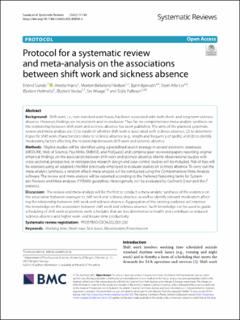Protocol for a systematic review and meta-analysis on the associations between shift work and sickness absence
Sunde, Erlend; Harris, Anette Kristoffersen; Nielsen, Morten Birkeland; Bjorvatn, Bjørn; Lie, Stein Atle; Holmelid, Øystein; Vedaa, Øystein; Waage, Siri; Pallesen, Ståle
Journal article, Peer reviewed
Published version

Åpne
Permanent lenke
https://hdl.handle.net/11250/3039712Utgivelsesdato
2022Metadata
Vis full innførselSamlinger
Sammendrag
Background
Shift work, i.e., non-standard work hours, has been associated with both short- and long-term sickness absence. However, findings are inconsistent and inconclusive. Thus far, no comprehensive meta-analytic synthesis on the relationship between shift work and sickness absence has been published. The aims of the planned systematic review and meta-analysis are (1) to establish whether shift work is associated with sickness absence, (2) to determine if specific shift work characteristics relate to sickness absence (e.g., length and frequency of spells), and (3) to identify moderating factors affecting the relationship between shift work and sickness absence.
Methods
Eligible studies will be identified using a predefined search strategy in several electronic databases (MEDLINE, Web of Science, PsychInfo, EMBASE, and ProQuest) and comprise peer-reviewed papers reporting original empirical findings on the association between shift work and sickness absence. Mainly observational studies with cross-sectional, prospective, or retrospective research design and case-control studies will be included. Risk of bias will be assessed using an adapted checklist previously employed to evaluate studies on sickness absence. To carry out the meta-analytic synthesis, a random effects meta-analysis will be conducted using the Comprehensive Meta-Analysis software. The review and meta-analysis will be reported according to the Preferred Reporting Items for Systematic Reviews and Meta-analyses (PRISMA) guidelines. Heterogeneity will be evaluated by Cochran’s Q test and the I2 statistics.
Discussion
The review and meta-analysis will be the first to conduct a meta-analytic synthesis of the evidence on the association between exposure to shift work and sickness absence, as well as identify relevant moderators affecting the relationship between shift work and sickness absence. Aggregation of the existing evidence will improve the knowledge on the association between shift work and sickness absence. Such knowledge can be used to guide scheduling of shift work to promote work schedules that are less detrimental to health and contribute to reduced sickness absence and higher work- and leisure-time productivity.
